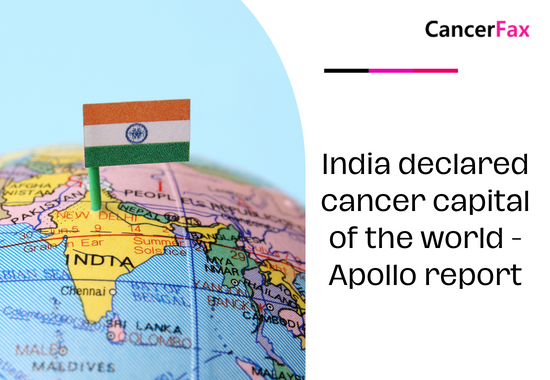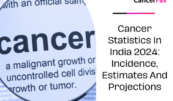India declared cancer capital of the world – Apollo report
India declared cancer capital of the world
India was designated as the “cancer capital of the world” in the 4th edition of Apollo Hospitals’ Health of the Nation Report, which was published on World Health Day 2024.
According to a report by PTI, this study on India’s health situation revealed concerning patterns in non-communicable diseases (NCDs), with a significant increase in cancer incidence around the country.
As per the 4th edition of the Health of Nation Report by Apollo Hospitals, on World Health Day 2024, almost 33% of Indians have pre-diabetes, 66% have pre-hypertension, and 10% are now dealing with depression.
The research emphasizes the alarming increase of non-communicable diseases (NCDs) in India, including cancer, diabetes, hypertension, cardiovascular illnesses, and mental health disorders, all of which have a substantial impact on the country’s health. India is experiencing a significant increase in cancer cases compared to global rates, which has led to the country being referred to as the “cancer capital of the world.”
Moreover, the paper predicts a possible rise in healthcare expenses caused by illnesses such as pre-diabetes, pre-hypertension, and mental health disorders manifesting in younger individuals. The paper highlights the significance of frequent health screenings in reducing blood pressure (BP) and body mass index (BMI) levels, hence lowering the risk of cardiac-related diseases.
The prevalent cancers in India, ranked by frequency, among women are breast, cervix, and ovary, and among men, they are lung, mouth, and prostate. Nevertheless, despite the comparatively younger age at which cancer is diagnosed in India in comparison to other nations, the rates of cancer screening are still disturbingly low, as stated in the hospital’s announcement.
Health screening and unified action are the needs of the hour
The analysis underscores the need for routine health exams to mitigate the likelihood of cardiac-related illnesses through the monitoring of blood pressure and body mass index values. Although there is an increasing recognition of the need for health checks, there is still a requirement to broaden their coverage throughout India.
Dr. Preetha Reddy, Vice Chairperson of Apollo Hospitals, emphasized the significance of collectively combating non-communicable diseases (NCDs). She emphasized the necessity of nationwide endeavors to properly address these diseases through education and tailored preventative healthcare solutions.
“It is imperative for the healthcare ecosystem and the nation to unite and adopt a cohesive approach in order to effectively address non-communicable diseases.” The findings revealed a pressing requirement for prompt therapies to combat, prevent, and reverse the escalating epidemic of cancer, diabetes, hypertension, and obesity, among other conditions. According to Dr. Reddy, there is an urgent requirement to provide education to the general public and develop personalized preventative healthcare strategies.
She advocated for the prioritization of investments in health infrastructure, the promotion of preventative healthcare measures, and the resolution of health inequities, in order to facilitate sustainable development in the health sector.
Dr. Madhu Sasidhar, President and CEO of Apollo Hospitals, emphasized the need for innovation in preventive healthcare and enhanced accessibility. He stressed the importance of using technology to improve illness prevention, increase the accuracy of diagnoses, and develop patient-centered treatment methods.
Dr. Nishant Mittal is a highly accomplished researcher with over 13 years of experience in the fields of cardiovascular biology and cancer research. His career is marked by significant contributions to stem cell biology, developmental biology, and innovative research techniques.
Research Highlights
Dr. Mittal's research has focused on several key areas:
1) Cardiovascular Development and Regeneration: He studied coronary vessel development and regeneration using zebrafish models1.
2) Cancer Biology: At Dartmouth College, he developed zebrafish models for studying tumor heterogeneity and clonal evolution in pancreatic cancer.
3) Developmental Biology: His doctoral work at Keio University involved identifying and characterizing medaka fish mutants with cardiovascular defects.
4) Stem Cell Research: He investigated the effects of folic acid on mouse embryonic stem cells and worked on cryopreservation techniques for hematopoietic stem cells.
Publications and Presentations
Dr. Mittal has authored several peer-reviewed publications in reputable journals such as Scientific Reports, Cardiovascular Research, and Disease Models & Mechanisms1. He has also presented his research at numerous international conferences, including the Stanford-Weill Cornell Cardiovascular Research Symposium and the Weinstein Cardiovascular Development Conference.
In summary, Dr. Nishant Mittal is a dedicated and accomplished researcher with a strong track record in cardiovascular and cancer biology, demonstrating expertise in various model systems and a commitment to advancing scientific knowledge through innovative research approaches.
- Comments Closed
- April 8th, 2024






Apollo cancer report 2024, Cancer epidemic India, Cancer prevention awareness, India cancer capital, Indian healthcare challenges, Indian oncology crisis, Lifestyle cancer risks, Rising cancer rates India
CancerFax is the most trusted online platform dedicated to connecting individuals facing advanced-stage cancer with groundbreaking cell therapies.
Send your medical reports and get a free analysis.
🌟 Join us in the fight against cancer! 🌟
Привет,
CancerFax — это самая надежная онлайн-платформа, призванная предоставить людям, столкнувшимся с раком на поздних стадиях, доступ к революционным клеточным методам лечения.
Отправьте свои медицинские заключения и получите бесплатный анализ.
🌟 Присоединяйтесь к нам в борьбе с раком! 🌟